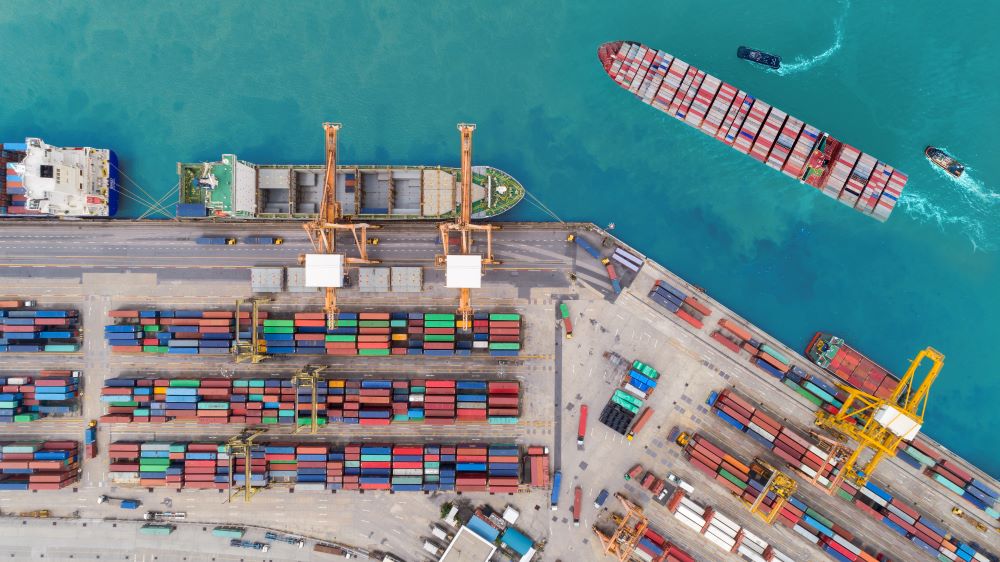
In the latest of the IOE&IT Daily Update’s round-ups on supply chai developments, we look at a cyberattack on a Japanese port, two shippers raising freight rates and another update in the ongoing saga of the Black Sea grain deal.
Freight rises despite oversupply
Ocean carriers have hiked shipping rates, despite wider concerns about oversupply in the marketplace.
Maersk has announced substantial rate increases on the popular Asia-North Europe lane, as the Danish shipper attempts to hold out against heavy discounting on the route.
Rates from the main Asian ports to Rotterdam, Felixstowe and Gdansk will increase on 31 July to $1,025 per 20ft container and $1,900 per 40ft container.
Maersk’s move comes in the face of continuing and accelerating rate erosion in the wider market. Xeneta’s XSI Asia-North Europe average spot is down to $1,224 per 40ft, having virtually halved since the beginning of the year, reports GCaptain.
Fellow shipping giant CMA CGM has followed Maersk’s price announcement, despite an oversupply on the route and a glut of new container ships launching soon, according to the Loadstar..
Hack attack on Nagoya
Japan’s largest port, Nagoya, has had its container operating system attacked by a Russian hacker group.
The computer system was affected, with a group called LockBit 3.0 demanding a ransom in exchange for the system’s recovery, reports the Japan Times.
Toyota’s export and imports were blocked by the action, although the company said the logistics of finished vehicles were unaffected as they are managed by a different computer system.
Operations at the port have resumed operations on Thursday morning, with chief cabinet secretary Hirokazu Matsuno noting that cybersecurity is increasingly important to Japan in light of this attack.
Strikes strand goods
Strikes at Canadian ports have resulted in around $12bn in trade being stranded in Vancouver and Prince Rupert, which handle almost 20% of US trade.
That amount could grow as talks between employers and the International Longshore & Warehouse Union are currently paused, reports CNBC.
Canada’s western ports have not serviced any vessels since June 30, with a total of 29 ports on the west coast at a standstill.
Writing in the Loadstar, Destine Ozuygur, head of operations at maritime intelligence company, eeSea said the effects of the strikes could lead to diversions, port swaps, omissions, slot reassignments and blank sailings.
The labour dispute is the latest in a series of strikes that includes European air traffic workers, German rail freight operators and Amazon employees.
Russia seeks bank deal
The EU is considering a “least worst option” proposal to allow a sanctioned Russian bank to reconnect to the global financial network in order to safeguard the threatened Black Sea grain initiative.
According to the FT, the compromise would allow the Russian Agricultural Bank to create a subsidiary to handle payments related to grain exports using the global SWIFT financial messaging system.
EU leaders discussed the possibility last week, as way to convince Moscow to extend the Black Sea agreement beyond its July 17 expiry, although early overtures on this solution were rejected by the Kremlin.
The Black Sea deal allowed Ukraine to export grain from its Black Sea ports but Moscow is holding out on renewal, reports Reuters.
Western governments want to preserve the grain export agreement – which is a financial lifeline for Ukraine – and to prevent aggravating a food crisis in the poorest countries by pushing global prices higher.
Food checks
Food traders have warned the government they will pass on £10m of extra charges levied for import checks on goods from the EU and the rest of the world.
The Fresh Produce Consortium (FPC), has written to ministers to share its members’ concerns that the UK’s post-Brexit border strategy will further fuel food inflation and could lead to food shortages.
It was responding to the government’s consultation on its new border strategy, known as the Border Target Operating Model (TOM), reports the Guardian.
According to Bloomberg, the UK is weighing options to tackle the cost of the checks on European food imports due to start in January.
DEFRA has denied any plan to delay the checks a sixth time, reiterating previous commitment to implement certification for relevant consignments from October and physical checks from January.



